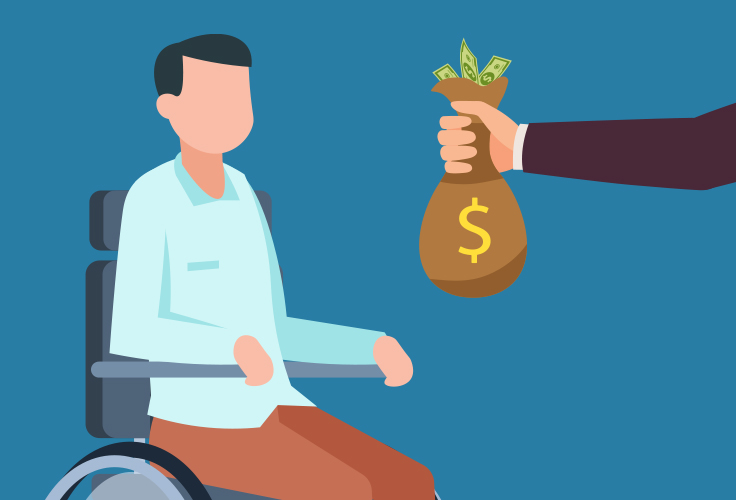
Have you been injured in South Carolina due to someone else’s negligence? You are not alone.
Getting the run-around from the insurance company? Here’s the ultimate guide on what you need to know about protecting your rights in a personal injury claim. We are here to help you.

This page refers to Personal Injury law in South Carolina.
Since laws differ between states, if you are located in North Carolina, please click here.
South Carolina Personal Injury Lawyers Who Fight for Your Best Interests
No one plans to be injured. It just happens. Thousands of people are injured every day through no fault of their own. It’s not their fault they have medical expenses, lose time at work, and have to deal with pain and suffering. And getting fair treatment can be challenging. That’s where one of our South Carolina personal injury lawyers can help.
Our law firm has helped more than 60,000 injured people recover more than $1.6 billion in total compensation since 1997, and our legal team has won numerous accolades.1
South Carolina Personal Injury Law Simplified
There are a few foundational aspects of South Carolina law that you might want to understand when thinking about contacting a personal injury attorney. Our personal injury lawyers will happily explain these details to you, so that you understand the how the law may affect your case. South Carolina is what is known as a “comparative negligence” state.
Comparative Negligence is a way to determine how much fault each party has in a personal injury case. In a situation where both parties were at fault, the amount of fault can be argued, usually by personal injury attorneys and insurers. If the sides come to an agreement, they settle. If the case goes to court, the jury decides who bears how much fault.
How Is Fault Calculated, and How Does It Affect Compensation in a Personal Injury Claim?

Therefore, in South Carolina, comparative negligence means that you may be entitled to a recovery, even if you share fault for the accident, as long as you are no more than 50% at fault. If you are deemed to be 51% or more at fault for the accident, you are not entitled to a recovery.
TIP: When you’re in an accident, and especially when you’re injured, it’s hard to think clearly. Even if you think you were at fault, you may not be – talk to a South Carolina personal injury lawyer at our law firm before you accept blame. In the case of a traffic accident, the police officer on the scene is going to ask questions. Answer with facts. That officer may have noticed something that points to the other parties, found other evidence, and so on.
 What Are Damages?
What Are Damages?
“Damages” is a term that refers to the compensation someone recovers when they’re harmed by someone else. The compensation literally covers the “damage” to the injured person. There are different types of damages, and different caps on the amount of damages one can receive depending on the individual circumstances of the case. A few examples are:
- Medical expenses
- Lost wages
- Loss of consort or family time
- Property damage
- Pain and suffering
What Are Common Causes of Personal Injuries?
Our personal injury lawyers help South Carolina accident victims seek compensation, regardless of the cause of their injury.
 |
|
 |
|
 |
|
 |
|
 |
|
 |
|
 |
|
 |
|
 |
|
 |
|
There are countless ways someone can suffer an injury because of someone else’s poor, unsafe, and irresponsible choices. If you’ve been injured, you need to be “made whole.” That’s a fancy way of saying the resulting bills, lost work, pain, and stress shouldn’t be yours to pay for.
What Are Some Personal Injury Special Cases?
Sometimes, a personal injury case has a special circumstance. These are cases where a personal injury lawyer can help injury victims and family members ensure they’re treated fairly and seek ample compensation.
 |
|
 |
|
 |
|
What Details Factor Into Personal Injury Cases?
Every case is unique, and circumstances vary widely. Here are a few key details that can affect the outcome of personal injury cases and are factors we’ve handled for clients. We have experience handling cases involving these factors (and more!):
- Uninsured/Underinsured Motorist Coverage – When someone who injures you doesn’t have enough insurance coverage – or no insurance at all – it’s your insurance company that needs to step up, depending on the amount of coverage you selected. In South Carolina, all drivers must have uninsured motorist coverage, but underinsured motorist coverage is optional.
- Personal Injury Protection (PIP) or Medical Payments Coverage (also known as MedPay or Med Pay) – In South Carolina, PIP is optional coverage for car wrecks that may be provided in your insurance policy. It covers you and your passengers, even if you cause the accident. If you didn’t cause the accidents, it still covers you in addition to the at-fault driver’s coverage. In other words, this type of insurance is available to pay medical bills regardless of who is at fault for your injuries.
- Soft Tissue Injuries and Internal Injuries – Internal organs take a lot of abuse in car wrecks, and connective tissues, like ligaments, can also be damaged.
- Spinal, Neck, and Whiplash Injuries – Some of the most difficult injuries involve the spine and neck, as these affect quality of life and ability to do for oneself.
- Broken Bones – There are different degrees of breaks that can take a while to heal, during which time you may not be able to work.
- Hit and Run Cases – Never, ever leave the scene of an accident. If you’re injured, call for and wait for help. If you are injured by someone who flees after causing a wreck, write down or record as much identifying information as you can to provide to law enforcement and your insurance company.
- Catastrophic Injuries to the Head or Brain – These injuries often require lifelong medical care. Knowing how to fight for fair compensation is key.
- State and Federal Tort Cases – Sometimes it’s not just another person who may be at fault. When they represent or work for the government, new rules come into play.
- Pedestrian and Cyclist Injuries – Sharing the road is a dangerous act, but pedestrians and cyclists have rights as well!
When Do Personal Injury Claims Become Personal Injury Lawsuits?
There is a common misconception among most of our personal injury clients that a claim and a lawsuit are the same things. They are not. Personal injury claims involve an insurance company. A lawsuit involves a court.
When Does a Claim Become a Lawsuit?
Our personal injury attorneys and clients begin by filing claims against the at-fault party’s insurance policy. The process involves a lot of evidence gathering, legal maneuvering, and negotiation. Knowledge of the law, medical treatment costs, liens, contract law, and more play a role when dealing with an insurance company.
When negotiations break down, and the insurance company won’t agree to what we believe is fair compensation, we may advise that our clients file a lawsuit. At that point, it is no longer just an insurance claim. We may also advise a client to file a lawsuit if the at-fault party’s insurance policy will not cover the damages our client has sustained.
Why Hire a South Carolina Personal Injury Lawyer?
Here’s another way to think about it: why do you think they’re called insurance “adjusters?” What exactly are they adjusting? The answer, in many cases, is that they’re adjusting any possible compensation as low as they can possibly get it to save the insurance company money.
The insurance company is in business to make money – and there’s nothing wrong with that. What that means, though, is that the insurance adjuster is not on your side. They may be sympathetic to your condition, but that doesn’t necessarily mean they’re trying to help you.
For help, you may need representation. That’s where an experienced, dedicated South Carolina personal injury lawyer comes in. At the Law Offices of James Scott Farrin we’ve helped thousands of clients, and we want to help you.1
Why South Carolina Injury Victims Choose the Law Offices of James Scott Farrin
- Our law firm has helped more than 65,000 injured people seek compensation.
- Our law firm is results-oriented with a proven track record.1
- Our law firm has hundreds of happy reviews from satisfied clients.
- Many of our personal injury attorneys have received prestigious recognition and accolades.
About the Law Offices of James Scott Farrin, and How We’re Paid
In a majority of cases, we work on what is known as a contingency fee arrangement. That is another way of saying that the attorney’s fee is based on a percentage of the gross recovery. While a case may have fees and costs associated with it, there is no hourly or flat fee charged by our law firm under a contingency fee arrangement.
Simply put, if you do not recover monetary compensation from your personal injury claim, there is no attorney’s fee.2 This allows us to bear the burden of investigating and pursuing your claim, which allows you to focus on your well-being.
Client Service Is Our Priority as Personal Injury Lawyers
- Call us 24/7, toll-free, at 1-866-900-7078.
- Get a free and expedient case evaluation with no obligation.
- We will come to you — to your home, job site, or hospital — morning, noon, or night.
- Your paralegal or attorney will be in contact frequently keeping you up-to-date about your case.
If you’ve been hurt, we want to hear from you. Call 1-866-900-7078, chat with us now, or contact us online as soon as possible. Tell them you mean business by hiring us!
READ MORE
- Aircraft Injuries
- Amusement Park and Water Park Accidents
- Assistance for Crime Victims
- Basics of SC Personal Injury Law
- Boating Accidents
- Cruise Ship Accidents
- Dog Bite Injury
- Electrocution Accidents
- Injuries to Children
- Medical Malpractice in South Carolina
- Serious Injuries
- Sexual Abuse & Assault
- Train Accidents
- Why Hire a Personal Injury Attorney
- Wrongful Death


 What Are Damages?
What Are Damages?